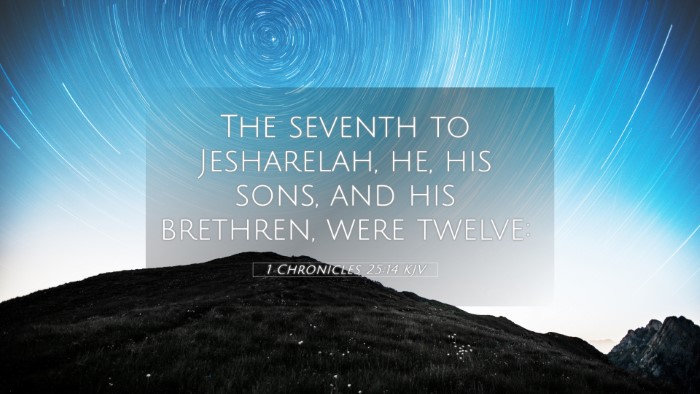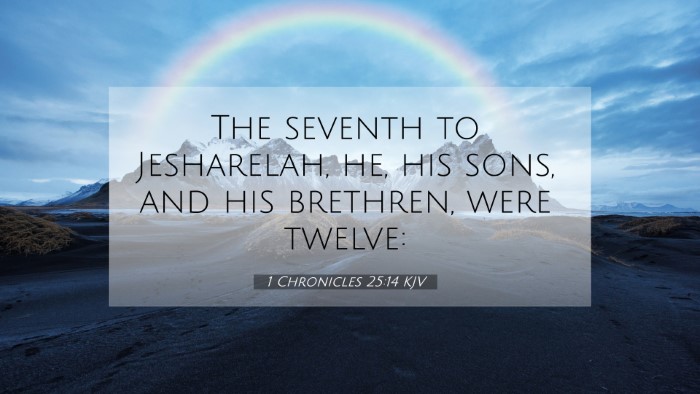Understanding 1 Chronicles 25:14
In the context of 1 Chronicles 25:14, we see the appointment of specific individuals for the ministry of music in the temple service. This verse highlights a crucial aspect of worship in ancient Israel, reflecting both the order and the importance of the musical ministry.
The verse states: "The fourteenth [to Heman], he, his sons, and his brethren, were twelve." This indicates that a total of twelve men were designated to serve under Heman, one of the key musicians in the temple worship.
Key Insights from Public Domain Commentaries
-
Matthew Henry's Commentary:
Matthew Henry emphasizes the significance of appointing individuals for divine service, arguing that such responsibilities should not be taken lightly. He notes that music in worship plays an essential role in heightening the devotion of the congregation and enhancing the overall worship experience.
-
Albert Barnes' Notes:
Albert Barnes connects this verse to the broader theme of organization within the Israelite worship practices. He suggests that the specific assignment of singers reveals God's desire for orderliness in worship. Barnes also draws attention to Heman’s qualifications and lineage, indicating that such roles were often linked to familial lines of service, highlighting tradition and heritage in worship.
-
Adam Clarke's Commentary:
Adam Clarke provides an analysis of the role of musicians in worship, asserting that music has always been an essential part of worship in both the Old and New Testaments. Clarke discusses how these musicians were seen as mediators in the temple, tasked with creating an atmosphere conducive to experiencing God's presence.
Bible Cross-References Related to 1 Chronicles 25:14
- 2 Chronicles 5:12-13: Details the role of musicians during the Ark's transportation, echoing the importance of music in worship.
- Psalms 33:1-3: Encourages praising the Lord with music, reinforcing the concept of music as a form of worship.
- Psalms 149:1: Calls for the people to sing a new song, portraying the idea of active worshipping through music.
- 1 Samuel 10:5: Mentions musicians as part of prophetic gatherings, showing the integral role of music in spiritual experiences.
- Nehemiah 12:46: References musicians as they ministered alongside the priests, demonstrating continuity in worship practices.
- Colossians 3:16: In the New Testament, calls for singing psalms and spiritual songs, linking the significance of music across covenants.
- Ephesians 5:19: Encourages speaking to one another with songs, further showing music's importance in Christian fellowship.
- 1 Chronicles 15:22: Discusses the appointed singers during King David's reign, establishing the historical continuity of worship leadership.
- Hebrews 2:12: References joining in song with believers, connecting the themes of community worship across the Testaments.
- Revelation 14:2-3: Presents a vision of heavenly worship involving music, illustrating that musical worship extends into eternity.
Thematic Bible Verse Connections
The thematic connections between this verse and others highlight how music was a foundational element of worship in the tabernacle and temple model. The intense focus on worship in unity can be seen as a precursor to New Testament teachings about worship within the believer’s community.
Conclusion & Reflections
Ultimately, 1 Chronicles 25:14 serves as more than just a historical account; it invites believer engagement in the practice of worship through music, encouraging contemporary followers of Christ to reflect on how they can incorporate these elements into their lives. By examining and cross-referencing these Biblical texts, we gain a richer understanding of God's intent for worship throughout scripture.


